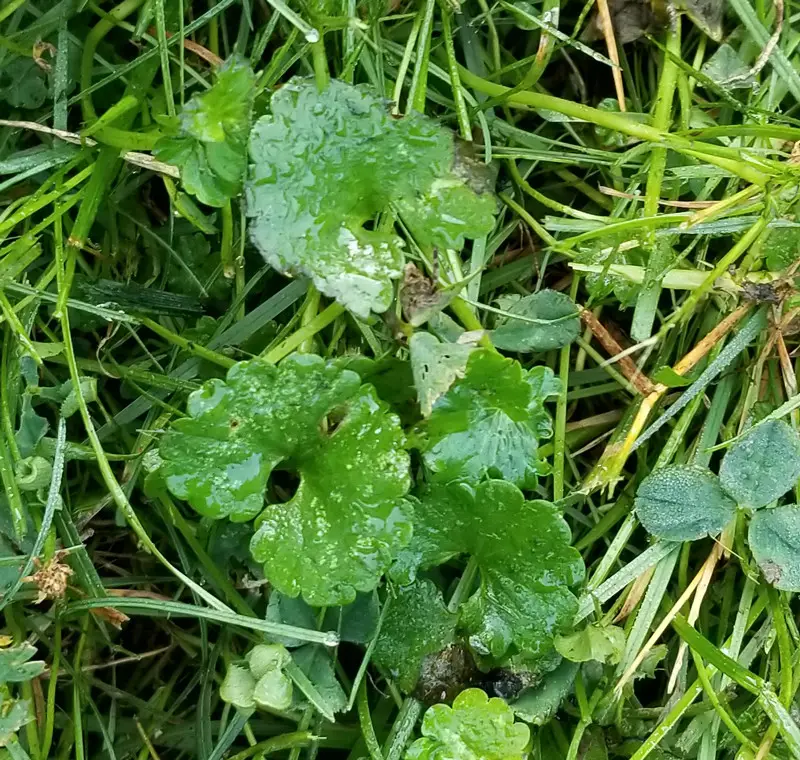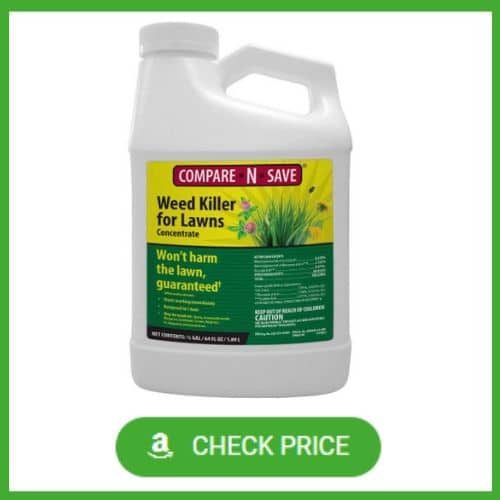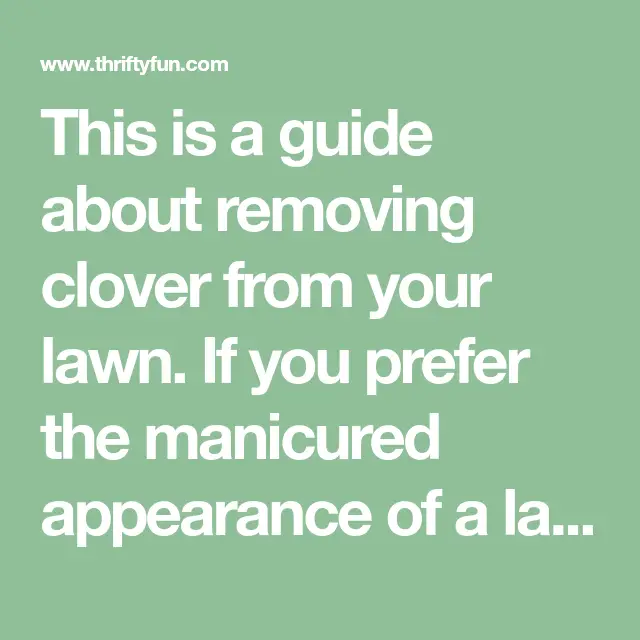What Damage Does Clover Do To My Lawn
As Ive explained, clover isnt particularly damaging, per se, but it can overtake your lawn if left to nature. In fact, clover naturally fertilises your grass because it draws nitrogen into the soil, which helps boost the green colour of your lawn.
And clover takes up the space that other, more damaging, weeds might take root.
However, getting rid of clover in your lawn is an aesthetic choice. And ultimately, the best way to avoid clover is to ensure that your grass plants are as healthy as possible.
Will Clover Choke Out Grass
If left alone, white clover will choke out all other plants in the garden and will keep coming back every spring. It can be grown as a ground cover or as an ornamental plant. Clover can also be used to make a tea. The tea is made by steeping the leaves in hot water for a few minutes and then drinking the resulting liquid.
Kill The Clover Organically
There is a great organic weed killer on the market that kills weeds in your lawn, without killing the grass. If you spray this organic weed killer on Clover, it will weaken the Clover without harming the surrounding lawn, giving your grass the advantage it needs to outcompete the Clover. Weed Beater Fe is the name of the product and we’ve had great success using it to eliminate Clover and help grass thrive.
You May Like: When To Buy Riding Lawn Mower
Spread Mulch Where Clover Has Taken Root
It may be tough to make sure youve got all the roots if the clover has sunk its root tendrils into your flower beds or the space around your trees. If you leave even one living root, you may see your clover return before long.
A simple solution is to lay down a piece of landscape fabric and dump a heavy supply of mulch on it. The mulch will nourish the soil around your flowers or trees, and the fabric will help prevent clover growth.
Also Check: What To Look For In Electric Lawn Mower
How To Identify Clover

Clover is a perennial plant that grows almost everywhere in lawns, alleys, flower beds, and even vegetable gardens. It is quite easy to identify with its leaves which are made up of three leaflets or its small white flowers in round clusters.
White clover is one of the most common weeds in gardens, it can grow in many different places, but it is especially found in sparse lawns where competition from grass is low. White clover grows in a creeping fashion and develops roots where a stem node touches the ground. The flowering period for clover begins in April and ends in September. The fight against clover must be done throughout the year.
You May Like: Will Lawn Fertilizer Kill Weeds
Why You May Want To Keeps Clover In Your Lawn
You may not like the appearance of clover. However, it can really benefit your lawn.
Natural Fertilizer: Clovers cooperative relationship with advantageous bacteria enables it to absorb nitrogen from the atmosphere. Eventually, it can make your lawn greener and richer. However, this will keeps it growing and outcompeting your turf. Also, check another post like best handheld massagers.
Weed Prevention: Mowing your lawn high wills prevent weeds from growing, consisting of clover. But if you like short, the neat lawn thats under 3 inches, letting clover grow is a strong choice. Clovers leaves cast shade over the soil, making it tough for other weeds to take root and grow and compete with your turf.
How To Recognise The Type Of Clover In Your Lawn
There are over two hundred varieties of clover, with a handful commonly found in the UK. The most recognisable characteristic is the trifoliate leaves that means there are three opposing leaves per stem although, records confirm that in rare cases, clover has been found with up to 56 leaves growing from one stem!
Don’t Miss: How Often Should You Dethatch Your Lawn
Good Things About Clover In Lawns
How Do I Rid My Lawn Of Clover
Just like a moss problem if you have clover growing in your lawn there are a number of reasons why this can happen so there are a number of solutions to get rid of it and keep it gone. To keep rid of it long term you will have to change the condition of the soil to make it ideal for thriving grass.
Here are some solutions to improve your lawn and get rid of clover
- Use a herbicide you can use a herbicide or weed and feed that is designed to get rid of broadleaf weeds. This will kill the clover but you should also be looking at a long term solution that improves your soil to make it ideal for grass as thats what will keep the clover gone.
- Use baking soda if you mix baking soda with water and spray it over your lawn this should get rid of moss and clover that is growing on your lawn. This should work but there is a risk it could damage your grass so you may want to test it on a small area first.
- Change your mowing height clover is known to thrive in short grass. If you change your grass cutting height to 3+ inches this should help combat clover. This length of grass will block out the light clover needs and you should see a dramatic change to your lawn.
- Fertilize your lawn if clover is growing in your lawn it suggests the condition of your soil is probably not perfect for growing grass. Clover can thrive in soil that is lacking in nutrients whereas grass will struggle. Adding a nitrogen-rich fertilizer will boost your grass and help it fight back against clover.
Recommended Reading: How To Measure Your Lawn
White Flowers In The Lawn Is It Clover
If you see white flowers in lawns in your garden, then the chances are that theyre clover. This small plant, which is technically a weed, has small flowers that are very fragrant and gather in clumps on the lawn. They are most often white, but you may also see pink, yellow, and red flowers from clover.
As we alluded to previously, there are some reasons why you might not want to kill clover in lawns, so lets take a look at some of those advantages.
Is Clover The Enemy Of Lawn Maintenance
Clover was a standard component of all lawns until relatively recently. In fact, due to its beneficial properties, clover was deliberately included lawn seed mixes.
Homeowners and green keepers didnt consider clover a problem until the 1950s. So what changed?
After World War II, the same companies that had been developing chemical weapons, turned their attention to pesticides. The formulation of herbicides made it possible to cultivate monocultures.
Suddenly, clover was marketed as the enemy, along with dandelions, bindweed, and other broad-leaved flowering plants.
However, it was precisely the companies that created and sold pesticides and herbicides, that were on the front lines of the new war against clover. The trend for unsustainable monocultures in gardens and agriculture was created through clever marketing by agrochemical corporations.
So, to wrap up that slightly depressing spiel, clover is not an enemy of a healthy lawn. But there are some pros and cons to weigh up when deciding how much of it to include in your yard. Lets look at them in more detail.
Recommended Reading: How To Get Rid Of White Grubs In Lawn
Why Is There So Much Clover In My Lawn
Clover thrives in soil with poor nitrogen levels. Grass needs nitrogen in the soil to grow well, while clover is able to get it from the air. Its possible that your soil is low in nitrogen because youve used too much or because its too acidic.
The symptoms of a nitrogen deficiency are similar to those of an excess of nitrogen, except that the symptoms are more severe. Symptoms include yellowing of leaves, stunted growth, and wilting. If you notice any of these symptoms, its a good idea to consult your local Cooperative Extension office for advice on how to correct the problem.
Best Post Emergent Herbicides

Post-emergent herbicides are the best way to kill clover. Just keep in mind they require a little patience since it could take a couple weeks for the clover to die back. Also, repeat applications will likely be necessary, and mixing in a little surfactant with the herbicide will help the herbicide stick to the plant. Also, notice that there are different recommendations for cool season grasses vs warm season grasses.
Read Also: How Much Does Massey Lawn Service Cost
Dragging Or Reducing With Hands
This is also a simple and budget free process. Most people use this method in a hurry-up but without ant usage of hand gloves. Thats why after digging with handsome timed skin elegy occurs.
So in this method, you should wrap up gloves on your both hand and dragging or strains the clovers with both hands until cloves are uprooted.
You should Remember while dragging clovers on the lawn try to streched clovers to be uprooted not only the upper plant layer. If you drag or stretched only the upper clover plant layer it does not eliminate or removes permanently.
You May Like: What Is The Best Lawn Sweeper
Should I Get Rid Of Clover In My Lawn
There are several reasons you may want to keep clover in your lawn. Due to its symbiotic relationship with bacteria, clover acts as a natural fertilizer. Clover gets its nitrogen from the air and releases it into the soil. Another benefit? Clover outcompetes other weeds. So instead of something unwanted and unsightly, you could have clover.
You May Like: Who Makes Snapper Lawn Mowers
Deprive It Of Oxygen And Sunlight
You can kill clover by blocking it from all oxygen and sunlight. Take plastic sheeting or a garbage bag and place it over the patch, securing the corners with rocks to make sure it doesnt fly up. This should get rid of the clover in a few weeks. Be mindful that this approach will also kill any grass that gets under the plastic.
Should I Remove Clover From My Lawn
A beautiful lawn is affected by Stubborn weeds. Yet, although its pretty stubborn, clover is actually beneficial. Nitrogen is brought into the soil and encourages grass growth when it is broken down. Micro-clover is included in some grass blends as a welcome addition.
Clover is a perennial grass, meaning it grows year-round in most parts of the U.S. However, it can be hard to find in your area, so you may want to look for it at your local nursery or garden center. If you cant find it, youll need to grow it yourself.
Also Check: How To Kill Ivy In Lawn
Clover Enriches The Soil With Nitrogen
All clover varieties are legumes , which means that they are nitrogen-fixers pulling nitrogen from the atmosphere and fixing it within their root system, with the help of some beneficial bacteria.
That means two things:
- Unlike regular lawn grasses, clover doesnt need any nitrogen fertilizer .
- It will enrich the soil with nitrogen, meaning that nearby plants will grow better, and you dont need to fertilize them either!
Perhaps there is a deeper reason why clover has been considered a lucky plant for so long!
Get Rid Of Dandelions
To kill dandelions, be sure to tackle them in the fall, when nutrients are transferred from the leaves down to the roots . An organic and effective way to get rid of this invasive weed is to use vinegar. The acetic acid in it makes for an all-natural herbicide. Apply it directly onto the leaves of the weeds. To increase the strength of store-bought vinegar, boil it down before application. Youll want to pour the vinegar into a spray bottle and spray the effected area. Within a few hours, youll notice the leaves have withered and turned brown.
Read Also: What Top Soil To Use For Lawn
How To Eliminate Clover From Your Lawn
This article was co-authored by wikiHow Staff. Our trained team of editors and researchers validate articles for accuracy and comprehensiveness. wikiHow’s Content Management Team carefully monitors the work from our editorial staff to ensure that each article is backed by trusted research and meets our high quality standards. This article has been viewed 7,409 times.Learn more…
If youre sick of dealing with the clover growing on your lawn, have no fear! You can easily eliminate it and keep it from coming back. To get rid of clover thats already on your lawn, you could use a potent herbicide to kill it, or you could make your own natural herbicide as an alternative. If you want to keep clover from setting up shop in your yard, give your lawn the TLC it needs to be healthy enough to prevent the weed from taking root.
How To Remove Clover

The most effective method of preventing clover from dominating your lawn is to maintain a dense and healthy lawn. Thick lawns are more easily able to crowd out weeds such as clover and prevent them from taking hold. .
There are also a few strategies you can try to get rid of existing clover in your lawn without using herbicides.
Feed you lawn well
Clover will flourish in lawns which have low nitrogen and fertility levels. Unfertilised grass gives clover an advantage as it can produce its own fertiliser, whereas grass cant. If there is sufficient nitrogen in your soil to keep your lawn healthy, the clover will struggle to survive. Clover will be much less of a problem if you fertilise your lawn with a good organic fertiliser during spring to ensure optimum nitrogen levels. To see Horsham Turfs range of lawn fertilisers, click here.
If youre not sure about your soils nitrogen levels, you can conduct a pH soil test to determine if nitrogen is lacking, or take a soil sample to your local lawn care provider to find out the same thing.
Mow high
It can be tempting to set your mower blades lower than normal to scalp the clover, but this will only stress your grass instead. Low-growing clover with its shallow roots has no problem being mowed short, although your grass wont love it. Mow high and leave your lawn over 3 inches tall, to give your grass the advantage. The longer grass will shade the weed and prevent it from growing.
Remove it by hand
Organic treatment
Read Also: What Is The Best Weed And Feed For Your Lawn
Covering Clover With Plastic Sheets
Covering clover with a dark plastic sheet such as a garbage bag will deprive it of two key elements sunlight and oxygen. Additionally, if it is in a sunny position, the plastic will sort of steam-cook the plants beneath it.
The method is practical only for larger, homogenous clover patches, as all plants will be killed, including the surrounding grass. However, you then have the option of re-seeding your lawn with a more appropriate grass seed mix that is better suited to your climate and water availability, and will be less likely to leave room for clover to return.
If youre not sure which grass species to go for, have a read of this article.
Planting Tips For White Clover
White clover is the most common clover grown in lawns because it is the lowest growing and hardy, Sharapova says. It has a creeping growth habit, spreading by above-ground runners . It is best to sow clover early in the season . She also suggests early spring months mid-April to mid-May as ideal times, with late summer and September being second-best. Clover plants like cool, fertile soil with adequate soil moisture. Its root system rarely goes more than 2 feet deep,, which makes it good for relatively shallow topsoil.
White-clover seed comes in many varieties and is readily available by mail order or at local gardening stores.
Mow the existing lawn short and rake out any thatch buildup so that the small clover seed has contact with the soil, she says. Mix the tiny clover seed with sand, compost, or soil to aid dispersal. 1-2 ounces of clover seed is needed for every 1,000 square feet of lawn.
The rest is natures work. Lawn owners can sit back and, over the next season or two, see a 5% to 10% clover cover establish in their lawn and experience the return of something natural, helpful, and beautiful that maybe we shouldnt have been so hasty to get rid of in the first place.
Read Also: How To Charge For Lawn Care Services
You May Like: Does Autozone Sell Lawn Mower Batteries
What Do Clovers In Our Lawns Indicate
The presence of Clover in lawns can be an indicator of low Nitrogen levels in the soil.
Clover requires soil with LOW Nitrogen levels because this plant can pull its Nitrogen requirement from the air.
Lawns love Nitrogen in the soil, and thats why its so important to feed our lawns with Nitrogen in the form of Organic Lawn Fertilisers, Standard Lawn Fertilisers, or by leaving the clippings on the lawn after mowing.
As soon as lawn soils begin to lack Nitrogen the lawn will become in poor health. And a lawn in poor health will be highly prone to other weeds, pests, and diseases, and will not have the necessary strength to fight off these infestations naturally by itself.
When we remember the important basic principle of prevention being better than the cure in Organic Lawn Care, we see the importance of keeping our lawns in optimum health so they dont suffer problems that may later require chemical treatments. So, lets get our lawn back to good health, and keep it there.